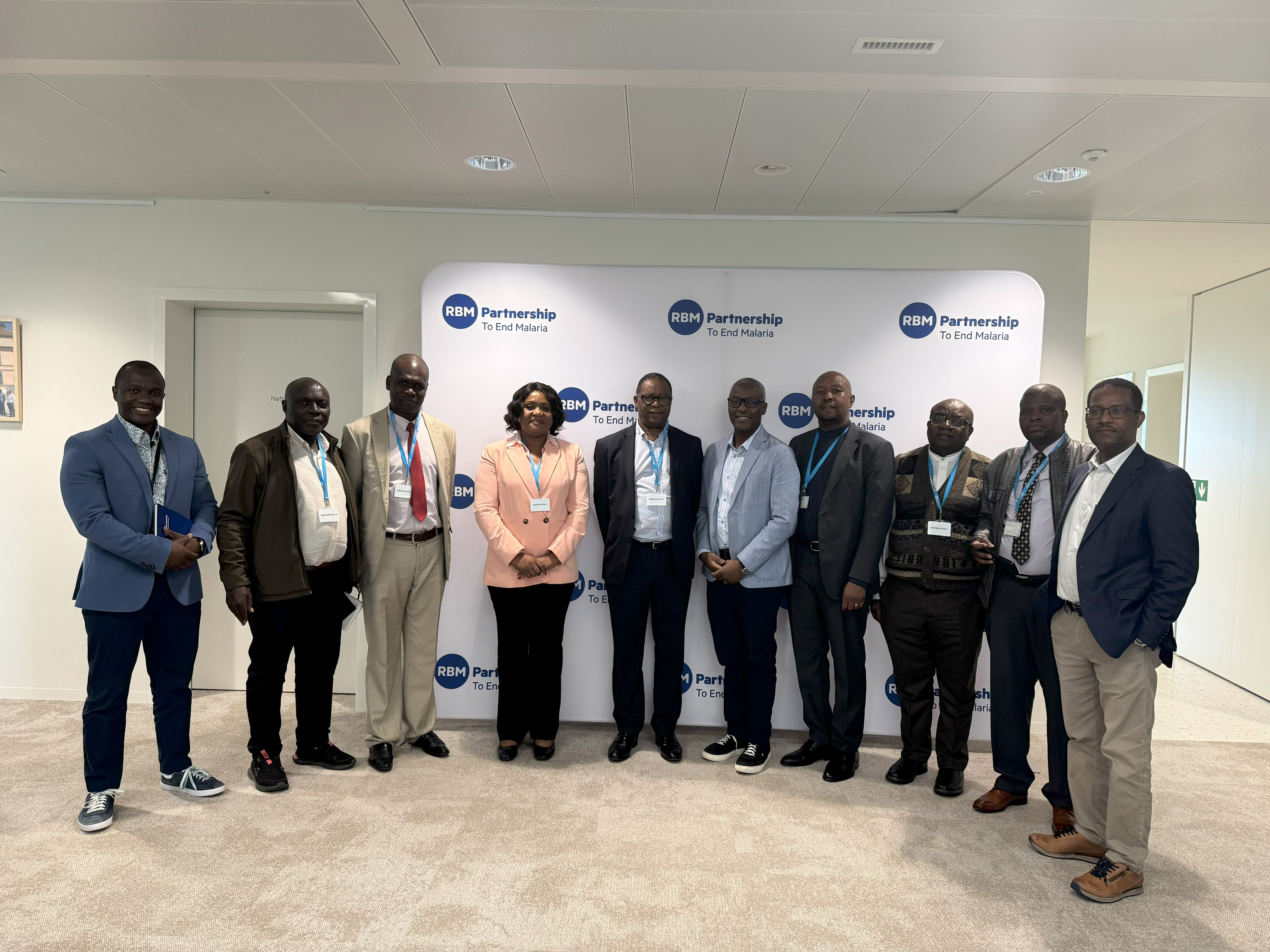RBM Board supports move to strengthen country-led malaria elimination, calls for more global support in the face of funding shortages
Geneva – The 33rd RBM Partnership to End Malaria Board meeting,held on 27–28 May,concluded with Board members emphasizing the importance of supporting countries to protect malaria gains and mobilise national and global resources to continue providing malaria interventions and saving lives. The Board welcomed the RBM Big Push against malaria as an essential roadmap that will bring RBM Partners together and ensure that the limited resources are maximized to provide malaria interventions that reach those who need them the most.
The RBM Board Chair, Joy Phumaphi called for increased and more deliberate use of data and contextual information to tailor interventions that suit countries and address urgent issues such as anti-malarial drug resistance.
“We commit as RBM and Partners to ensuring that countries get support because we know that once we have commitment, once we have leadership, then we shall be able to move. Countries have shown commitment through their domestic resource mobilization efforts, and we are committing to supporting these countries,” she said.
The CSO representatives on the Board committed to mobilizing communities to end malaria and support government resource mobilization and accountability. Noting that Malaria kills 600,000 people every year, 95 percent of whom are on the African continent, RBM CEO Dr Michael Adekunle Charles called the situation unacceptable and called for more to be done to respond with the urgency that this dire situation deserves.
A staggering reality
“600,000 deaths every year translates into 1,600 deaths a day. This is the same as having five jumbo jets carrying about 300 people crash every day, mostly carrying Africans. If five jumbo jets crashed every day, this would be news. It is a staggering reality when you think about it. We must act urgently to reach countries and bring their issues to the regional and global level so that we have holistic and comprehensive solutions,” Dr Charles said.
He highlighted how RBM has worked with partners and countries to ensure key interventions such as provision of insecticide treated mosquito nets and advocacy at key moments such as the African Union Summit continue. He stressed that while the biggest brunt of malaria is borne by Africa, malaria still remains a challenge for people in Asia, the Pacific and Latin America – and these must not be left behind.
Even though there has been progress over the past two decades, the fight against malaria continues to face new challenges. The hybrid online and limited in-person Board meeting was held at a time when increasing resistance to malaria drugs is making it more difficult and expensive to treat malaria. In addition, mosquitoes are becoming resistant to insecticide while unpredictable climate patterns have increased the incidence of malaria even in places where it was low. All this is happening amid growing humanitarian and health crises in the face of funding shortages. Globally, $4.3 billion – only about half of the $8.3 billion that we need to eliminate malaria by 2030 – has been availed. Even before the emerging funding challenges, there was a funding gap of over 300 million insecticide treated nets.
Innovating to close funding gap
The Board meeting also featured presentations from Ministerial Malaria Champions who shared country and regional realities on malaria and how they have responded during the shifting funding landscape.
Equatorial Guinea Minister of Health, Hon Mitoha Ondo’o Ayekaba stated that they are combining traditional and new innovative malaria interventions to ensure that the country’s recently-launched 2030 Malaria Elimination Plan to safeguard progress and confront challenges is implemented.
The country has partnered with the private sector to address the funding gap and ensure that key services such as vaccination and the distribution of insecticide treated mosquito nets continue. In line with commitments made under the Yaoundé Declaration, 80 percent of the country’s malaria measures are in high-risk areas.
“Reduced funding to malaria in Equatorial Guinea threatened the bed net campaign for 200,000 homes and seasonal chemo prevention for 120,000 children. These are not just numbers but lives that remain at risk if we do not unite and innovate to close the malaria funding gap,” Hon Ayekaba said.
Opportunity in crisis
The Zimbabwe Minister of Health and Child Care, Hon Dr Douglas Mombeshora represented the Southern African Development Community (SADC) and called for greater unity and better coordination to promote country and regional-led solutions to malaria under the Big Push framework. He described the malaria response as a litmus test for health system resilience and stated,
“Centring the country and regional perspective in the fight against malaria is not just commendable but essential. Malaria gains are fragile and must be preserved by continuous investment. Even in a crisis there is opportunity – opportunity for better coordination, regionally-led and country-owned solutions.”
RBM Board Members commended countries for their continued commitment to prioritizing the fight against malaria. They endorsed RBM’s revision of the 2025 work plan to respond to funding changes and implement the Big Push, with countries and regions at the center. They also recognised the work put in so far to develop the RBM Strategic Framework 2026-2030, which will highlight this renewed direction and better link national, regional and global malaria efforts for greater impact.
***
About RBM Partnership to End Malaria
The RBM Partnership to End Malaria is the world’s largest platform dedicated to eliminating malaria, a mission it has championed since 1998. With over 500 partners, including malaria-endemic countries, bilateral and multilateral development agencies, private sector organizations, and community-based groups, RBM is accelerating collective action to end malaria through one last Big Push – a unified voice and action to confront the disease and its impact on people, health systems and development.
Follow us on social media tags
For more information, contact Patience Akumu, RBM Advocacy and Communications Manager, email: patiencea@unops.org, phone: +41795547367.

